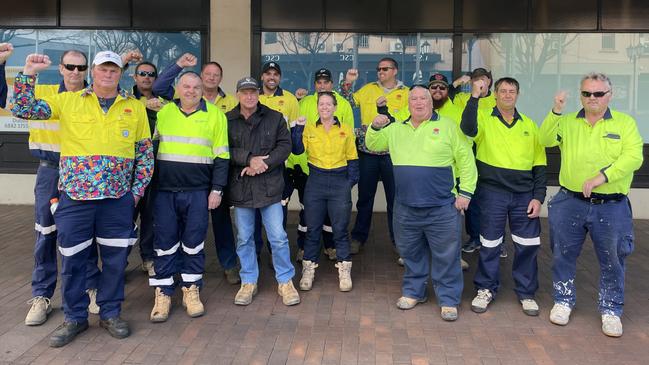Road workers, construction crew, and transport staff join members from across the state to strike for 24 hours
Road workers, construction workers and other Transport for NSW employees in Dubbo have taken part in a 24-hour strike. Here’s why.
Dubbo News
Don't miss out on the headlines from Dubbo News. Followed categories will be added to My News.
Members of The Australian Workers’ Union (AWU) in Dubbo have joined road and construction workers from across the state in a 24-hour strike in a push for better wages and working conditions.
It marks the first time members of the union have taken industrial action this century, with AWU organiser Cameron Wright saying wages had stagnated, and ongoing negotiations with Transport for NSW had failed to address workers’ concerns.
“We’ve had five negotiating meetings with Transport for NSW, they’ve all been very civil, there’s no sort of disrespect or disharmony in the room,” Mr Wright said.
“But I think it’s become obvious because of the (NSW Government) wages policy that was implemented back in 2011, we’re negotiating with someone that doesn’t necessarily have the capacity to negotiate.”

Mr Wright said the state government must come to the table to meet the demands set out by the union to better reflect the necessary wage increases as inflation rates across the country continued to rise.
As conditions become increasingly tougher, Mr Wright highlighted the dire situation workers were facing which has led to those in the regions taking part in industrial action for the first time since November 1989.
“It’s been a very long time since these workers in regional NSW have taken industrial action,” Mr Wright said.
“We certainly don’t take industrial action lightly, we understand that guys that are already struggling with the cost of living pressures are going to lose a day’s pay out of this.
“But we just felt like we had no other option, we’ve sat down and bargained in good faith, we’ve put forward our log of claims and we’ve tried having negotiations.
“Transport for NSW is hamstrung by the wages policy and until that changes I don’t know what impact they can have.”
The AWU has joined other unions in the public sector in taking industrial action this year and Mr Wright pinpointed the plight of teachers, nurses, paramedics and other public servants who are fighting against the wages policy set out by the NSW Government.
So much so, Mr Wright said workers are being deterred from even wanting to take up jobs in the industry along with poor retention rates.
“People are not interested in working for the sorts of rates that are currently paid,” Mr Wright said.
“To be honest, if I think it was up to Transport for NSW management, I think they’d happily give a larger increase because then they would be able to attract and retain quality staff members.
“There’s a real push for them to recruit up to 500 employees as the scope of work increases, and as quickly as they recruit them they seem to be losing them out the back door because they just aren’t paying enough.”
To the “delight” of Mr Wright, more than 15 members from the AWU in Dubbo gathered at the Band Rotunda in the CBD to let their voices be heard, as they made their way to Member for Dubbo, Dugald Saunders’ office.
“Areas like Dubbo haven’t traditionally been union strongholds, we have had members there but I think a year ago, had you asked members in Dubbo to take industrial action, they would’ve probably ushered you out the room,” Mr Wright said.
“This is how dire it is that you’ve got people that aren’t traditionally unionists that are taking out industrial action.”
The strike began at 6am on Thursday and will end at 6am on Friday.
In a statement, a spokesperson from Transport for NSW said it was given “late notice” of the industrial action.
“The AWU gave a commitment to respond to genuine emergency situations during this period of action,” the spokesperson said.
“Transport for NSW will seek the urgent assistance of the Industrial Relations Commission to resolve these ongoing matters.”





